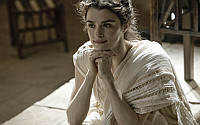
scr Alejandro Amenábar, Mateo Gil
prd Alvaro Augustín, Fernando Bovaira
with Rachel Weisz, Max Minghella, Oscar Isaac, Ashraf Barhom, Michael Lonsdale, Rupert Evans, Richard Durden, Sami Samir, Manuel Cauchi, Homayoun Ershadi, Oshri Cohen, Harry Borg
release Sp 9.Oct.09, UK 23.Apr.10
09/Spain 2h07

Pondering the meaning of life: Weisz



CANNES FILM FEST
TORONTO FILM FEST
 Ambitious in scope, this film feels over-serious and oddly cold. Fans of historical dramas may love it, but you're in trouble when theories about the sun and earth are more involving than the interpersonal dramas.
Ambitious in scope, this film feels over-serious and oddly cold. Fans of historical dramas may love it, but you're in trouble when theories about the sun and earth are more involving than the interpersonal dramas.
In 4th century Alexandria, Hypatia (Weisz) is a noted philosopher who teaches at the famed library. But the world around her is changing, as Greek and Egyptian beliefs conflict with Christians and Jews. And with the Roman Empire gaining power, the Christians have the edge. As Hypatia continues to explore her far-advanced theories about the earth and the universe, she finds herself caught between two men who love her: loyal servant Davus (Minghella) and the civic leader Orestes (Isaac). And the fundamentalist Romans aren't happy with her radical thoughts.
This is an odd misstep for Amenabar, who usually keeps his focus on people over spectacle to tell character-stretching stories. Those elements are here, but they're battered into submission by the film's lavish scale, with vast sets and a cast of thousands (both are probably digitally enhanced). It looks fascinating, avoiding the shiny bombast of Hollywood-style productions for something much more gritty and realistic. And the character-based story at least holds our interest even if it fails to make its point.
Weisz is terrific in an underwritten role that essentially requires her to send one tear down a cheek every 30 minutes or so. But this is a complex, intelligent woman who was way ahead of her time (her theories were unproven until more than a thousand years after her death). Her scenes with Minghella and Isaac generate some brainy emotion, and the supporting cast is also strong. Although it's not easy to keep them straight beyond the villainous bishop (Samir), the rabble-rouser (Barhom) and the devout student (Evans).
We can feel Amenabar straining for a sweeping-epic tone, which never works because the story lacks emotional clarity. As a result, the dialog sounds stiff and meaningless, and the lack of sharp edges makes it feel more like a dull, ponderous TV movie than a big-screen blockbuster. Maybe it would have been more effective as a TV series in which characters and the tensions between them could have been deepened into something more satisfying.
 |
themes, violence | 24.Mar.10 |

 Still waiting for your comments ... don't be shy.
Still waiting for your comments ... don't be shy.
HOME | REVIEWS | NEWS | FESTIVAL | AWARDS | Q&A | ABOUT | TALKBACK